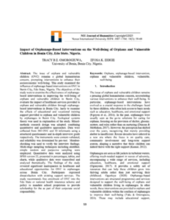The issue of orphans and vulnerable children (OVC) remains a global humanitarian concern, prompting interventions to enhance their socioeconomic well-being. This study examined the influence of orphanage-based interventions on OVC in Benin City, Edo State, Nigeria. The objectives of the study were to examine the effectiveness of orphanage-based interventions in improving the well-being of orphans and vulnerable children in Benin City, evaluate the impact of healthcare services provided to orphans and vulnerable children through orphanage-based interventions in Benin City, lastly to examine the effects of educational and vocational training support provided to orphans and vulnerable children by orphanages in Benin City. Ecological systems theory was used in explanation of the study. Mixed-methods research design was adopted, combining quantitative and qualitative approaches. Data were collected from 384 OVC and 10 informants using a structured questionnaire and in-depth interview guide respectively. The instruments were content-validated, and reliability was determined by pre-test. Member-checking was used to verify the interview findings. Multi-stage sampling techniques including stratified, simple random and purposive sampling were employed. Quantitative data were analyzed using SPSS version 22, presented in percentages, tables, and charts, while qualitative data were transcribed and analyzed thematically. The findings of the study revealed significant inadequacies in healthcare and educational opportunities for OVC in orphanages across Benin City. Participants expressed dissatisfaction with existing support services. The study recommends free enrolment of OVC into the Edo State or national health insurance scheme and policy to mandate school proprietors to provide scholarship for the as part of their corporate social responsibility.

